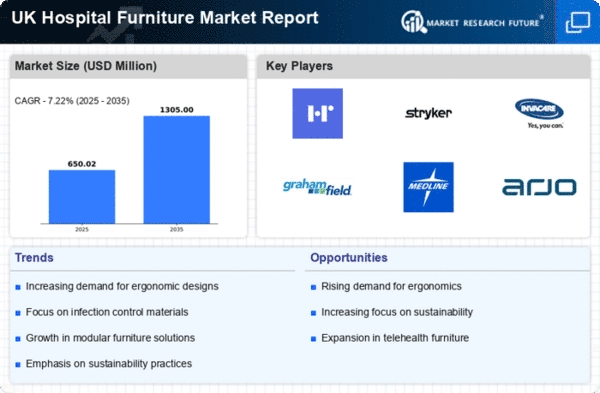The hospital furniture market is currently characterized by a dynamic competitive landscape, driven by factors such as technological advancements, increasing healthcare expenditures, and a growing emphasis on patient comfort and safety. Key players like Hill-Rom (US), Stryker (US), and Arjo (SE) are strategically positioned to leverage these trends. Hill-Rom (US) focuses on innovation in smart hospital beds, enhancing patient monitoring capabilities, while Stryker (US) emphasizes the integration of advanced technology in surgical furniture. Arjo (SE) is committed to improving patient mobility solutions, which aligns with the increasing demand for ergonomic designs. Collectively, these strategies contribute to a competitive environment that prioritizes quality, safety, and technological integration.
In terms of business tactics, companies are increasingly localizing manufacturing to reduce lead times and optimize supply chains. This approach appears to be particularly relevant in the context of the UK market, where logistical efficiency is paramount. The competitive structure of the market is moderately fragmented, with several players vying for market share. However, the influence of major companies remains substantial, as they set benchmarks for quality and innovation that smaller firms often strive to meet.
In October 2025, Hill-Rom (US) announced a partnership with a leading technology firm to develop AI-driven patient monitoring systems integrated into their hospital beds. This strategic move is likely to enhance patient care by providing real-time data to healthcare providers, thereby improving decision-making processes. Such innovations not only bolster Hill-Rom's market position but also reflect a broader trend towards digital transformation in healthcare.
In September 2025, Stryker (US) launched a new line of surgical tables designed with enhanced flexibility and ease of use, catering to the evolving needs of surgical teams. This product introduction is significant as it underscores Stryker's commitment to innovation and its ability to respond to market demands swiftly. The focus on user-friendly designs may also enhance operational efficiency in surgical environments, further solidifying Stryker's competitive edge.
In August 2025, Arjo (SE) expanded its product portfolio by acquiring a smaller firm specializing in advanced mobility aids. This acquisition is indicative of Arjo's strategy to broaden its offerings and enhance its market presence. By integrating new technologies and products, Arjo is likely to strengthen its position in the mobility solutions segment, which is increasingly critical in hospital settings.
As of November 2025, the competitive trends in the hospital furniture market are heavily influenced by digitalization, sustainability, and the integration of AI technologies. Strategic alliances are becoming more prevalent, as companies recognize the value of collaboration in driving innovation. Looking ahead, it appears that competitive differentiation will increasingly hinge on technological advancements and supply chain reliability, rather than solely on price. This shift suggests a market evolution where innovation and quality take precedence, shaping the future landscape of the hospital furniture market.























Leave a Comment